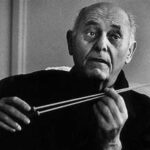Editor’s note: DJB calls this work “an amalgamation of two columns I wrote for The Gazette, the Washington Post’s Newspaper of Politics & Business, in 2000. I added new writing to bring it up to date, and while doing so I discovered it did not need much updating.” He adds he will not be watching the Grammys on TV.
Grammys, Spammys
by DJ Bartel

The 66th Grammy Awards are coming Sunday, February 4, 5 PDT, from the Crypto.com Arena here in L.A. Be sure to plan your viewing experience to include the Premiere Ceremony, to be streamed from somewhere else prior to the gosh-golly, breathtaking spectacle telecast. The Premiere Ceremony, so-called not because it is somehow better than the broadcast but because it comes first, is where all the second-rate Grammys will be handed out to those musicians who don’t rank TV facetime, including Gustavo Dudamel (nominated six times for four different awards), Thomas Adés, whose ballet Dante is nominated three times including for Best Contemporary Classical Composition, and Yo-Yo Ma whose recording with pianist Emmanuel Ax and violinist Leonidas Kavakos of Beethoven’s “Pastoral Symphony” arranged for trio is a revelation. Almost no one knows about the Grammys in the Classical genre because they are viewed by the National Recording Academy of Arts & Sciences as a separate species from the wide range of other nominees. In fact, Grammy’s highest honor, Album of the Year, is chosen from the full spectrum of musical genres except classical.

This year’s Grammy for Best Album may go to SZA’s much heralded revenge record SOS containing the immortal lyrics “I hate everybody, I hate everyone,” one of nine nominations for SZA, or GUTS by Olivia Rodrigo, featuring the charting track “Get Him Back” about Rodrigo’s lust to return to her ex-boyfriend and get vengeance, or the Grammy may go to Miley Cryus’s Endless Summer Vacation, which showcases her usual low common denominator music and probing lyrics such as “I don’t know / Who the hell you think you’re messin’ with / Get the fuck out of my house with that shit / Get the fuck out of my life with that shit,” but it won’t go to Jeff Scott’s oratorio Passion for Bach and Coltrane which combines classical music and jazz with the illuminating poetry of A.B. Spellman:

my swing is more mellow
these days: not the hardbop drive
i used to roll but more of a cool
foxtrot. my eyes still close
when the rhythm locks; i’ve learned
to boogie with my feet on the floor
i’m still movin’, still groovin’
still fallin’ in love
(“Groovin’ Low”)

Perhaps you will not be surprised to hear that the Grammys hold less cachet in the classical music community than in the public at large. Among the musical elite, Grammys’ smell of competition generally provokes a haughty disdain. Violinist Anne-Sophie Mutter once told me, “We’re not sports figures and I’m not competing against anyone, other than my ideals of playing a specific piece.”

For four decades I observed the reactions of world-class musicians to the annual Grammy orgy. Their response may best be described by recalling a story about Charles Ives. Officials from Columbia University visited the great composer’s New Haven home to inform him he had been awarded the Pulitzer Prize for his Third Symphony. Standing in the doorway to his living room, Ives told the officials, “Prizes are for children,” and closed the door on them.

The devoted grunts who run the public relations engines of record companies and orchestras are not so blasé. Legendary conductor Michael Tilson Thomas said, “It’s a process like the Oscars. There’s a certain amount of positioning and politicking, which you know is going on. There are some people who get very very heavily involved in that sort of thing. I don’t particularly.”

Originally, the Grammys were a product of Hollywood 1958, where the recording industry was fast gravitating and classical music still held a viable place in the market. The first Grammy for Best Classical Album was awarded in 1961 to Stravinsky’s performances with a Hollywood studio musicians orchestra of The Rite of Spring and Petrouchka. Stravinsky was a darling of the L.A. art set. I can’t imagine any classical music aficionado choosing Stravinsky as the finest interpreter of his own music.

In ensuing years, controversy tainted the Classical Grammys. Accusations flew of ballot-stuffing! Leonard Slatkin, former St. Louis Symphony and National Symphony Orchestras maestro, as well as six-time Grammy winner, explained to me: “Anyone who makes a recording may vote. The controversies arose when some places stacked the deck by basically enrolling all of the members of their choruses and orchestras into the voting ensemble.”

What scoundrels these? To name three, the Atlanta Symphony, the San Francisco Symphony, and most notably the Chicago Symphony Orchestra which was so skilled at Grammy cheating it resulted in their maestro Sir Georg Solti winning a record 31 Grammys, the first for his Best Opera Recording of Verdi’s Aida, with the Rome Opera Orchestra, in 1963, the same year the Album of the Year award went to Vaughan Meader’s satire of the Kennedys, The First Family, which was a winner over comedian Allen Sherman’s album My Son, The Folk Singer, and Tony Bennett’s I Left My Heart in San Francisco, the title track of which won Record of the Year. Solti won his final Grammy in 1991 when he took home the trophy for his record with the Chicago Symphony & Chorus of Bach’s B Minor Mass.

You’ll get no argument about the Grammys from Robert Shafer, conductor of the Washington Chorus, who was stunned by the news that his recording of Benjamin Britten’s War Requiem, had been nominated for Best Choral Performance. The record was the culmination of Shafer’s nearly 40-year love for the War Requiem. The 54-year-old maestro had the giddy flush of a first-time nominee when he told me, “It would be a great, great honor to win. I would be very moved for this profound work.” He said he considered it the last century’s greatest composition for chorus and orchestra. “The work itself is what’s the most important thing. The awards and the applause, all that is fleeting, but the relationship you have with the music, and with the people that make the music with you is what’s lasting.

All makers of music, even such music as this which holds no hope of ever receiving a Grammy nomination, recognize our happy tapping as the golden nugget of music. “Dear friends and gentle hearts,” to borrow words from the great Reconstruction era songwriter Stephen Foster, spoken with his dying breath, let me whisper in your ear: The golden nugget of music is communication. How exactly is the Recording Academy measuring such a thing to determine which musician’s communication, its breath and depth, is better than the next?
Who has Grammys, who has fewer Grammys?
Beyoncé 32 – Otis Redding 2
Vladimir Horowitz 25 – Jackson Browne 0 (8 nominations)
Stevie Wonder 25 – Leonard Bernstein 16
Foo Fighters 15 – Pink Floyd 1
John Williams 25 – Brian Wilson 2
Bruce Springsteen 20 (50 nominations) – Frank Sinatra 9 (31 nominations)
Bob Dylan 10 – Justin Timberlake 10
Taylor Swift 14 – Michael Tilson Thomas 11
Lady Gaga 13 – Ella Fitzgerald 13
Henry Mancini 20 – Snoop Dogg 0 (16 nominations)
Barbra Streisand 8 (46 nominations) – Diana Ross 0 (12 nominations)
Michael Jackson 13 – Roger Miller 11
Paul Simon 16 – Simon & Garfunkel 7
Madonna 7 – Prince 7 (28 & 38 nominations, respectively)
Emerson String Quartet 9 – Joni Mitchell 9 (13 & 17 nominations)
Natalie Cole 9 – Nat King Cole 1
Willie Nelson 10 – Miley Cyrus 6
Cher 1 – Sonny & Cher 0
Yo-Yo Ma 19 – Aretha Franklin 18 (29 & 44 nominations)
Ray Charles 17 – Eminem 15
Tony Bennett 19 – Al Green 11
Linda Ronstadt 10 – Katy Perry 0
Kenny G, Elvis Costello, Pearl Jam, Dave Matthews Band, Chicago, Bon Jovi, Al Hirt, Queen Latifah, Nirvana, Alfred Newman, Paula Abdul and America, 1 each.
Jay-Z 24 – Bob Newhart 3.